
37 minute read
CSI Abcon Group Foundation driving transformation`
Abcon Group Foundation driving transformation
Abcon Group Foundation (AGF) was founded by Abland Property Developers and is part of the Abcon Group of companies which operate in the property and built environment industry. AGF adheres to delivering ethical and comprehensive transformation solutions though the establishment of key community and corporate partnerships.
Advertisement
The group provides holistic B-BBEE facilitation services to sustain three pillars of transformation, Socio Economic Development, Skills Development and Training including Enterprise and Supplier Development. The Group’s focus in the Socio-Economic Development pillar is to mainly support disadvantaged communities in South Africa. By doing so, AGF then becomes the driver of progressive social change in their sphere of influence as approved by the Section 18 (a) of the income Tax Act 58 of 1962.
AGF has adopted three beneficiaries to assist and to support their required needs. Furthermore, the group runs SED projects and initiatives benefiting underprivileged pupils from creches to matric.
2019 achievements
AGF SED Property AGF owns a 2.5 HA piece of land. This land has been lying fallow, they contacted the Bona Lesedi Disability Centre, who for many years were based in the informal settlements of Diepsloot. As the number of the students with disabilities increased in their container classrooms, the operating conditions grew to be unbearable for the physical and mental state of the students. The venue became smaller, making it difficult for the students to learn and to be physically mobile.
AGF found a solution to one of the countries neglected sectors and partnered with Bona Lesedi; the disability center then moved into their new home at the AGF’s property in Timsrand. This gave light to the 60 people living with disabilities. Today, they can plant their own garden, run skills development programs, play on their own tennis court and as for the cherry on top, benefit from 10 of their in-house classrooms
SOUTH AFRICAN PROPERTY REVIEW Londiwe Mthembu, with Dave Savage
AGF Genesis Creche Beneficiary Education plays an important role in AGF’s heart which has led to the group’s longterm sustainability strategy at one of their
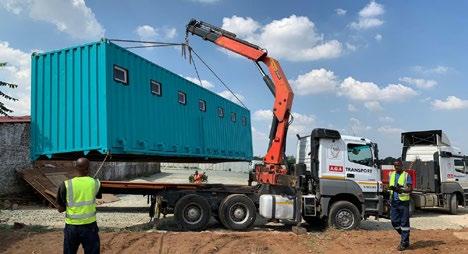
beneficiaries, Genesis Creche. The objective is to create an environment of growth and influence for som 130 kids coming from underprivileged homes. AGF


invests time in taking care of the kids’ emotional needs. AGF give them support in providing for their needs as well as spoiling them with Easter parties during their favorite time of the year.
Hawk Academy school The thought of 140 grade 4 learners coming from information settlements at one of AGF’s other beneficiaries, Hawk Academy School, still using an old tent as a classroom had grieved the group’s hearts greatly. It was not long after that and the group reached a conclusion with the help of supporting partners to launch two brand new mobile classrooms catering for all the grade 4 learners. Not only that, addressing the issue of sanitation in most of our schools, the group also launched 24 secure ablutions facilities ensuring the standard required by the Department of Education has been met.
Abcon has in this year placed 9 classrooms and 24 ablution facilities at the school. Two of the classrooms are being used as a science lab and a computer lab.
Mandela Day Nothing beats the overwhelming support Abcon receives from their annual Mandela Day events. Over 200 volunteers from partner companies took part and the day ended with almost 1400 people being fed from their soup kitchen activity. 50 trees were planted, that soon, will provide shade for the kids in their playgrounds. The team handed out 1200 scarves to the learners. Knitted 150 blankets for the grade R students who were once sleeping on their classroom floor. The senior learners got a chance to meet one of the Mrs SA finalists who taught them more about career goals and the secret behind creating vision boards as an investment into their futures.
Fundraising Potjie Competition Abland, hosted the biggest Potjie fundraising competition with 103 companies participating in support of the AGF’s vision. The event was a great success, a family fun day held with loads of fundraising activities. Over R1 million was raised towards helping with the infrastructural developments at Hawk Academy School.
Abcon Group Foundation hopes to continue reaching out to disadvantaged communities in need. We aim to expand



our partnerships to minimise the effect of our economic challenges.
The Amdec Group – developing more than property
The Amdec Group is marking 30 years in business and making concrete plans for the future, with a pipeline of big developments coming on-stream, as well as significant recent acquisitions, and the completion of a major project. They have also put considerable effort into their CSI programmes, which have seen dynamic growth in the past year.
The upcoming R14 billion Harbour Arch mixed-use precinct on the eastern edge of the Cape Town CBD, is set to break ground before the year is out. The Amdec Group has also acquired Sitari Country Estate near Somerset West in the Western Cape, adding to its portfolio of lifestyle estates that includes Val de Vie and Pearl Valley outside Paarl, and Westbrook in Port Elizabeth. Meanwhile, the first residents have moved into its latest residential development – One on Whiteley at Melrose Arch in Johannesburg. Its international portfolio is also growing, bolstered by a number of properties secured through its Amdec USA operations. Amidst all of this growth, the Amdec Group has not lost sight of its social responsibilities, maintaining a twin focus with its CSI programmes: the environment, and supporting talented but disadvantaged youngsters who excel at academics and sport through initiatives linked to education and sports development.
The Amdec Group CEO, James Wilson, says, “Education and young children really are the future of our country. If we’re going to be prosperous and take our rightful place in the world, we all need to be focused on our young children getting a good education.
Also, in tough economic times, it’s important for businesses to stay the course in terms of their commitment to charitable causes.
The Amdec Group supports:
ENVIRONMENT Save Our Rhinos is the brainchild of the Amdec Group Chairman, John Wilson, a wildlife enthusiast and photographer. It raises funds for the SANParks Honorary Rangers, a group of unpaid volunteers who give freely of their time to support conservation in South Africa’s National Parks. Amdec has raised more than R1.25 million for them over the past five years. All of the donated funds are poured into their work – no public money is used to finance the rangers’ activities, and every cent donated goes towards funding anti-poaching activities. Find more information on the new Save Our Rhinos Facebook page at facebook.com/ AmdecSaveOurRhinos.
EDUCATION The Amdec Group’s CSI work in education includes supporting a young learner at Christel House school in Ottery, a southern suburb of Cape Town, where the philosophy is to give children a hand up – not a handout. Young lives change when children are brought from areas where poverty, gangsterism, drugs and crime are the norm, and taught to become self-sufficient, contributing members of society. Robust education and strong character development are supported by healthcare, nutritious meals, counselling, career advice, and family assistance. Children are tracked until they are in their mid-20s to make sure they are able to sustain themselves. This year, the Amdec Group brought former NASA astronaut Dr Don Thomas to Christel House. He shared the story of journey to outer space happening only after NASA turned him down three times. But he persevered and ultimately soared. His story gripped his young audience.
Through its involvement as main sponsor of the Reddam Foundation Golf Day, the Amdec Group helps support several talented children from disadvantaged backgrounds to get a world-class education at Reddam House Constantia, one of the best schools in the country. Not only do they benefit from superior quality education, but they can also draw upon the outstanding resources and facilities at the school.
SPORT The Amdec Group is the main sponsor of the Marius Schoeman Sports Festival, one of the largest celebrations of school sports in the world. This year, it expanded to include short formats of three codes: Sevens rugby, Fast-Five hockey and FastFive netball, across three age groups – under 12, under 15 and under 17.



An under-17 invitational development schoolboy sevens rugby team took to the field for the first time this year in the shape of the Amdec Blitz. Funded by the Amdec Group, the squad is drawn from the Be The Difference foundation, which helps children from areas ravaged by drugs, gangsterism and violence, uplifting them through sport, nutrition, education and social programmes. Be The Difference players are routinely scouted and given bursaries to attend top schools throughout the country. That is a ticket out of poverty and a pass to a bright future for not only the individual children but often also their families and communities.
In addition, the Amdec Group supported young cyclists from the Songo social development programme, based in the Kayamandi informal settlement
outside Stellenbosch, so that they could participate in the STBB4GOOD MTB Challenge, with hundreds of mountainbikers and trail-runners all helping to raise funds for Miles for Smiles.
OPERATION SMILE Every year, the Amdec Group lends a helping hand to children born with facial deformities like cleft lip and palate by way of raising funds for the work of Operation Smile.
The STBB4GOOD MTB Challenge is the flagship CSI initiative of long-time Amdec business associates, STBB. This year, it brought together nearly 600 trail-runners, and more than 1,300 mountain-bikers to raise funds for the Cipla Foundation’s Miles for Smiles initiative that helps children with facial deformities.
Miles for Smiles supports the work of Operation Smile, an organisation that arranges the delicate operations that help these children live normal lives. For just R5,500 per operation, a child’s life is not only changed, but saved. These deformities are not just cosmetic – they are life-threatening. These children cannot be breast- or bottlefed as they are unable to breathe and swallow normally. They face an uncertain future from the moment they’re born. Many suffer from malnutrition and other medical problems, and often don’t reach their first birthday. Even if they survive beyond that, they could be ostracised for their appearance and the speech impediments that result from the condition.
The annual cyclethon that takes place at the Amdec Group’s Melrose Arch development in Johannesburg, raises funds for the Smile Foundation, another charitable organisation working in support of children born with facial deformities. The Smile Foundation collaborates with academic hospitals to offer corrective facial reconstructive surgery and treatments.
Hundreds of children have been helped over the years, through relatively simple operations that have completely transformed their appearance and their lives. Each one a little miracle.
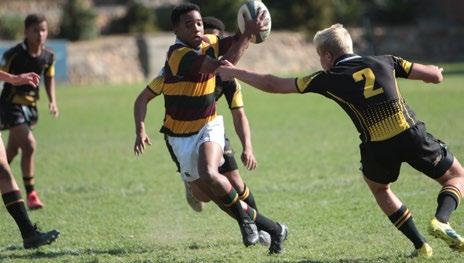
For more information, please contact the Amdec Group CSI Manager, Shannon Mark on shannonm@amdec.co.za or 021 702 3200, or visit www.amdec.co.za and click on Giving Back.
CDH pro bono and human rights practice, commitmented to giving back As a well-resourced and influential commercial law firm Cliffe Dekker Hofmeyr (CDH) recognises that with every success comes an ever- increasing responsibility to give back to society. In 2011, as a demonstration of our commitment to giving back, CDH formed its dedicated Pro Bono and Human Rights Practice (our Practice). Our Practice's core objective is not only to provide access to legal services to those who cannot afford to pay for them, but also to constructively engage in promoting constitutional values and uplifting communities through training and special project work, with a focus on the development and empowerment of our youth.

We also recognise that the future of our nation lies with our youth, and hence the necessity of uplifting and supporting our youth as best we can. As lawyers, we believe that an essential step in uplifting the youth is building awareness about the Bill of Rights and other laws that provide fundamental protections to all in our country – because knowledge is power. We also recognise the importance of skills development and mentoring. Accordingly, CDH has over the years initiated and supported several youth development initiatives and continues to expand its involvement in such projects.
One of our most recent youth

development initiatives was the roll out of our 2019 Youth Day initiative. As part of this initiative young lawyers from both our Johannesburg and Cape Town offices spent time with youth from disadvantaged communities as the first step in fostering longer term programmes. In Johannesburg we reached out to the Strathyre Girls Home which houses roughly 45 girls who have all been placed in the care of the Salvation Army via the Children's Court. While the girls all have different reasons for being at the Home, many come from a background of abuse, neglect or abandonment.
Members of CDH visited approximately 30 of the girls at the Home. Young woman lawyers gave an inspirational talk to the girls on the importance of self-love, selfaffirmation and understanding the meaning of one's name as a crucial tool in establishing one's identity. The talk concluded with each girl sharing their respective dreams and aspirations for the future, followed by an informal tea with lots of eats, photos and laughs. CDH will continue to engage with the Home to explore training opportunities that will harness and grow the potential of these girls.
In Cape Town we partnered with Just Grace, an NGO focused on providing holistic support for the Langa, Cape Town community, with a special focus on supporting and empowering the youth of Langa. Just Grace currently supports between 200 to 250 primary and secondary school students and their families by providing access to social work, legal and socio-economic support. During June 2019 Just Grace ran its holiday club programme, creating a safe, stimulating and positive space for the students to spend their school vacation.
It was during this holiday club programme that 10 young lawyers from CDH visited Just Grace to run a workshop themed "Youth Empowering Youth". They shared challenges faced in their journeys to becoming successful young lawyers and the tools they'd used in overcoming these challenges. The students were invited to share their own challenges, and together with our young attorneys created empowerment posters that shared messages of hope, positivity and
encouragement. The posters remain on display as a motivational reminder to the students. Our Practice will continue to collaborate with Just Grace on various youth empowerment initiatives.
In August 2019, as part of our Women's month initiative, in partnership with the Zola Advice Office, the Johannesburg office hosted a women's day finance workshop in Zola, Soweto. The workshop was aimed at women in the area who are owners of small businesses / head up non-profit organisations (NGOs) and it was focused on themes such as setting up a company / NGO and various aspects of corporate governance and compliance. The objective of the workshop was to help empower young women entrepreneurs and to encourage and foster entrepreneurship in the Zola community. In November 2019, the Johannesburg office will in partnership with the Ethafeni Multiskill Centre (the Centre) also host a wills and estates planning workshop in Tembisa for members of the Tembisa community as part of an ongoing partnership with the Centre to provide legal education to the community it serves. The workshop will focus on a range of topics including factors and implications to consider when drafting a will, marital property regimes, estate structures, tax implications, and the administration processes of deceased estates.
In recognition of the importance of fostering skills among our youth, CDH runs a two-week biannual vacation programme. The programme provides law students

from universities across the country with an opportunity to be exposed to the inner workings of a commercial law firm while developing their professional skills. As part of the programme, CDH also awards several bursaries to law students on an annual basis.
Another notable initiative is our partnership with the National Schools Moot Court Competition, a project aimed at building human rights awareness amongst school children across the country and providing exposure to the legal profession.
Importantly our Practice also dedicates significant resources in protecting and enforcing rights by litigating on behalf of vulnerable youth and other vulnerable individuals and communities. For example, we are presently helping the Field of Dreams Children's Centre (Field of Dreams) to obtain documentation for a number of learners who are currently not attending school due to their undocumented status. Field of Dreams is an NGO established to give hope to children in the Brits community in the North West Province through learning programmes, feeding schemes and health care services. We will be working closely with Field of Dreams to ensure that these learners are able to access their rights to basic education.
CDH is also excited to be partnering with Section27, an influential public interest law centre that works to promote substantive equality and social justice. In September 2019, we launched a new pilot project in which some of our candidate attorneys volunteer their time on a weekly basis at the Section 27 advice office. We are of the view that this project will provide an invaluable opportunity for young lawyers in our firm to learn about public interest law and assist in promoting social justice.
At CDH we recognize and hold ourselves to the duty to use our legal skills to shape and mold our society toward one that is just for all. We recognize that if we want to go far, we must go together. It is in this spirit that our Cape Town office has partnered with Ikamva Labantu, a grassroots, nongovernmental and non-profit organization focusing on childhood development and the wellbeing of older persons in Cape Town's townships. Through initiatives with Ikamva Labantu, CDH attorneys are able provide expert legal services to and otherwise support members of the communities in which Ikamva Labantu has a presence.
One such initiative is the 2019 Mandela Day Event. For our 67 minutes of action, we invited 10 of Ikamva Labantu's senior citizens to our office where we ran a beading and jewellery making workshop. In honour of Madiba, members of the Cape Town office sat with and learnt from the older generation, reflecting on the importance of giving back whenever we can. We were taught by the Ikamva seniors to make beaded accessories, and some of those already on display were purchased, the proceeds of which were handed over to the seniors and Ikamva. These and the various other relationships we have built, are rooted in our shared goal of actualising human rights in some of the most vulnerable areas of our society and our commitment to giving back. With Practices in our Johannesburg and Cape Town offices, we are able to contribute to the realization of an equitable society in which the most vulnerable members are heard, supported and have sufficient access to legal skills and services.
For more information about CDH, its pro bono practice and vacation programme please visit our website: https://www. cliffedekkerhofmeyr.com/en/index.html.
Growthpoint GEMS
Growthpoint’s CSI programmes are aimed at creating a more inclusive society. We use our existing resources and work with historically disadvantaged communities to achieve this. One of our core focus areas is education and we work across the education value chain to effectively create impact within the communities we work with. One of our growing and exciting projects is the company’s in-house project - Growthpoint GEMS.
While Growthpoint had established its footprint in a wide range of communities through its CSI initiatives, the CSI team felt it was important to provide support to the dedicated staff within in the company. Growthpoint GEMS started in 2017, with the mission to provide support to qualifying staff’s children in the form of bursaries.
Bursaries are awarded to learners from Grade 4 or who are already in secondary school.
Secondary school bursaries are limited to students younger than 20 years old. The overall objective of the Gems fund is to afford learners and students the opportunity to enroll at good public or former Model C schools, as well as tertiary institutions. The bursary covers costs related to prescribed school fees, uniforms, stationery and learning materials, and transport limited to school field and sporting trips.
Tertiary bursaries are awarded to students who are currently in Grade 12, those that have completed their secondary schooling and those already at tertiary institutions. Ultimately, Growthpoint Gems is aimed at assisting students to obtain or complete their first undergraduate degree.
As the programme has progressed, we have gained valuable insights into
the socio-economic issues that are facing multiple homes in South Africa. To provide a more holistic approach, we have extended the programme to include psychosocial, leadership and parent support. adults from all backgrounds to learn and excel. By investing in the future, we hope to have an enduring positive influence on the fabric of South African society, while also assisting our dedicated staff, where possible.
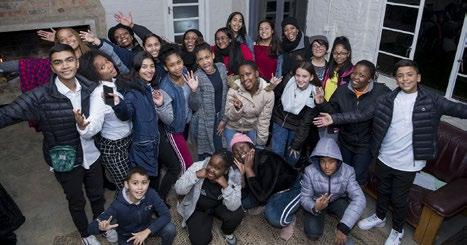
We understand that for education to thrive, investment in our own people is crucial. As a committed partner to bettering South Africa and its children, we have ensured that we create opportunities for children and young
GEMS 2017/18 statistics: ● Total: 63 students ● R4.9 million invested ● Year group split: 17 in primary, 29 secondary, 17 tertiary
Geographic split: ● Eastern Cape – 3; ● Gauteng – 34; ● Western Cape – 18; ● North West – 2; ● Limpopo – 1; ● KwaZulu Natal 5;
Smartest kids in the Eastern Cape
Gcobani Primary School has been named champion of this year’s Eastern Cape Growsmart Literacy Competition, clinching not only a R350,000 iPad Lab for the Buffalo City school, but also R20,000 each towards furthering the education of the three students on the winning team.
The delighted Gcobani Primary School pupils who triumphed at the ICC on the day are Oyintanda Molose, Bonga Lisakhanya, and Lathitha Songelwa, mentored by Ms Buyiswa Gobe.
Eighty schools took part in this year’s hotly-contested inter-primary competition, featuring group literacy and individual story-writing. Participation was substantially increased from the 60 schools that registered for the inaugural competition held in the province last year.
Five schools made it through to the final, with Malabar Primary (Nelson Mandela Bay) placed second with team members including Laaiqah Khan, Aasiah Niekerk, and Suhaylah Essop, mentored by Ms Meena Ragar. Nontuthuzelo (Buffalo City) come in third thanks to team members Njabulo Melane, Thayama Matolweni, and
Akhanya Dayimani, mentored by Mr Siya Mgalagala. Other finalists included Sydenham Primary and Young Park Primary, both from Nelson Mandela Bay district.
In the concurrent Growsmart storywriting contest, Linathi Nyiki from CW Hendrickse Primary took first prize of R20,000, followed by Shamirah Witbooi in second, and Sivuyiso Oyo in third.
A highlight of this year’s competition was the publication of the Eastern Cape’s first ever Growsmart Story Book, containing the top 20 stories – 19 of which came from Nelson Mandela Bay.
Growsmart – a joint initiative from Growthpoint Properties and the Eastern Cape Department of Education – aims to
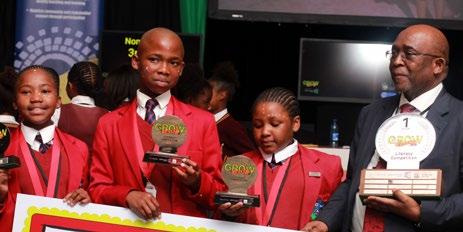
actively inspire and improve performance in the province’s primary school students. The region’s Growsmart prize pot totals around a half-a-million rand in rewards for winning pupils, mentors, and their schools.
“The value of this project cannot be underestimated,” comments Genevieve Koopman, Chief Director of the Eastern Cape Department of Education. “Growsmart is happening at the right time, where the country is focusing on improving reading in all primary schools. It encourages learners to read, understand and narrate stories, in sentences. It also empowers teachers to be great mentors of teaching and reading.”

“I was part of the Growsmart Programme from the beginning in the Eastern Cape, when it started in 2018,” adds Lutho Kota, from the department. “I will support and continue to be part of this great programme – we are committed to working with the Growsmart Programme all the way.” Jewel Harris, Regional General Manager at Growthpoint Properties, says, “We are so excited to see the programme grow and to witness the positive impact that it has on our young learners. Not only is Growsmart inspiring, it’s also about making learning fun, and rewarding the children’s efforts.”
Growsmart turns ten – and the champions are crowned
If there was a champion of champions in this year’s tenth annual Growsmart primary schools’ competition in the Western Cape, then it must surely by Factreton Primary School, which clinched not only top spot in the literacy category, but also came third in the story writing competition.
St Raphael’s Primary School triumphed overall in the fiery debating category; Floreat Primary School clinched Mathematics; and Montague Primary took home the story writing trophy, in which individual learners both pen and illustrate their own book.
For the winning school in the literacy category, this means a spectacular R350 000 iPad Lab, as well as R20,000 for each of the children in the winning team, to go towards furthering education. Second and third place also win substantial improvement prizes for their school, and education funds for the children. Growthpoint gave the winning schools even more reason to celebrate by announcing a R10 000 prize for winning schools in all subjects, for school refurbishments.
The keenly-contested Growsmart competition, an initiative of Growthpoint Properties in collaboration with the Western Cape Education Department (WCED), began in 2009 in an effort to boost literacy, numeracy and science performance in primary schools in the province.
“Twenty-first century skills such as communication, critical thinking, creativity and collaboration are essential for every learner,” says Dr Peter Beets, Deputy Director-General of Curriculum and Assessment Management at WCED. “They each have a very unique and powerful aspect and will better prepare students for tomorrow’s jobs. Being
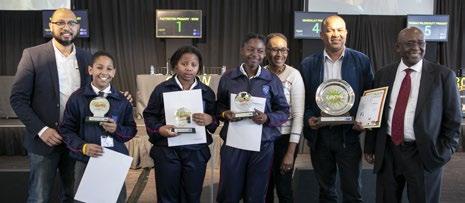
proficient in reading, writing and math skills will not be sufficient skills for the future. The importance of developing all these skills is something that Growthpoint Properties fully understands and we are very appreciative of the investment Growthpoint has provided.”
He adds: “Corporate investment in education is vital and I would sincerely like to thank Growthpoint not only for realising the importance of education in creating a better South Africa, but for actively promoting reading, writing and calculating,
and the 4 C skills in our primary schools. They have invested a lot – not only money-wise, but also time-wise.” Growthpoint Properties’ regional general manager Jewel Harris comments: “Despite their circumstances, where they may come from, and what they may deal with on a daily basis, these children have learned that they too can shine. That is what Growsmart is about: giving children an opportunity to thrive, to go above and beyond, and to reach their dreams.” She further encourages all this year’s contestants to “shine like the super stars that you are.”

WINNERS’ TABLE: Debating: Winner: St Raphael’s Primary School – Libhongo Nogqala, Rosie Tshinguta, Sinovuyo Qongo. Mentor: Althea Serenge. Literacy: Winner: Factreton Primary School – Juliet Nduwayo, Sheldon Gladden, Inako Tu. Mentor: Juan Smith. 2 nd : Blue Downs Primary School – Camagwini Njoli, Campbell Dirks, Dylan Afrika. 3 rd : Balvenie Primary School – Aisha Williams, Liam Libbie, Devaun Van Niekerek. Mathematics: Winner: Floreat Primary School – Andre Cerf, Keyon Johnson, Diego Vorster. Mentor: Brent Solomons. 2 nd : Newfields Primary School – Zavier Petersen, Yusuf Hartley, Uthmaan Moos. 3 rd : West End Primary School – Adhraa Richards, Darryl Afrika, Tamika Sam. Story Writing Winner: Montague Primary School – Cade Arendse. 2 nd : Regina Coeli Primary School – Jayden J Willemse. 3 rd : Factreton Primary School – Moegamat N Daniels. Most creative: Balvenie Primary School – Keisha Geduld.
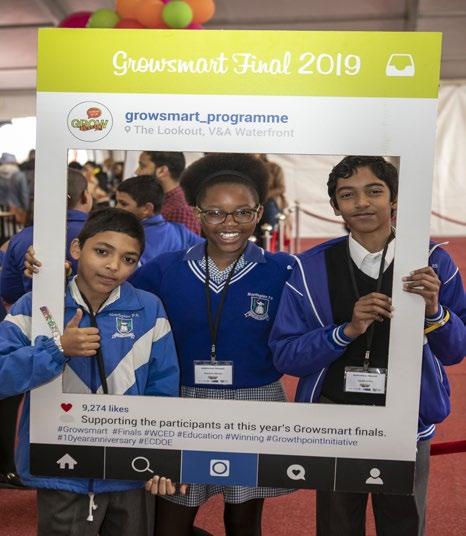
Growsmart winners represent South Africa at the African Spelling Bee
A young learner from Liwa Primary School in Nyanga, one of Cape Town’s townships with a troubling past and few resources today, showed the world that a person’s background doesn’t define their future.
Unamandla Mqaleni represented her country, school and community at the African Spelling Bee in Uganda where 18 countries and 108 spelling champions competed.
Mentor and teacher Andrew Gumindoga accompanied her to the competition and described her performance as extraordinary. Rising above the difficult circumstances in her community, Unamandla competed with excellence and made it all the way through to the competition’s second round.
The day after she returned from the competition, Mr Gumindoga overheard her telling her fellow learners at Liwa Primary School, that their background doesn’t determine their ability and if they always work hard, they can do it.
Learner and teacher ascribe her success in large part to the Growsmart literacy competition - both were part of the team that won the prestigious Growsmart title in the Western Cape province in 2018. Liwa Primary has been participating in the Growsmart educational programme since Growsmart’s inception a decade ago.
Growsmart is a keenly-contested annual competition, was started and funded by Growthpoint Properties and fully supported by the Western Cape Education Department. It helps the learners and schools that need it most to boost Literacy, Story writing, Mathematics, Science and Debating in, and takes place at a level where it can have the biggest impact, in Grades 4, 5 and 6.
It has grown to include the abovementioned competitions and as of next year, intends to add Entrepreneurship to the Western Cape competition offerings. Two years ago, Growsmart expanded into the Eastern Cape and next year, the competition intends to launch in Limpopo.
Growsmart - Unamandla Mqaleni, learner from Liwa Primary School in Nyang

It is no secret that South African schools continue to face major challenges in Literacy, Mathematics and Science. The size of this massive challenge is clear in the alarming statistics, which place South Africa troublingly low on national and international benchmarks in all three areas. Since inception it has more than doubled its reach from 80 to 160 schools in the Western Cape and the Growsmart newspapers have been distributed to over 70,000 children.
Mr Gumindoga explains that while he put Unamandla through her spelling paces in preparation for the continental spelling battle, Growsmart had already ensured that she was very well equipped.
“In fact, a spelling bee covers only one of the three levels of literacy training emphasised in Growsmart, which includes spelling, defining and using a word correctly,’ says Mr Gumindoga. “This prepared Unamandla well and has created and important stepping stone for her. She is also very talented and hardworking. Unamandla was exceptionally brave. She presented with such grace. We are incredibly proud of her.”
Growthpoint Properties’ regional general manager Jewel Harris explains that the Growsmart competition is designed to boost their school performance, but also to change lives. “Growsmart helps children gain exposure on bigger platforms and really launches them to greater things. It is a platform to excel. This is exactly what Unamandla has done, and we congratulate her on all her hard work and this wonderful achievement.”
Growsmart was approached to enter an alumni into the 4th African National Spelling Bee, and facilitated sponsorship for Unamandla and Mr Gumindoga to attend along with young spelling champs from counties including Benin, Botswana, Ethiopia, Gambia, Ghana, Kenya, Lesotho, Liberia, Malawi, Nigeria, Rwanda, Sierra Leon, South Africa, Tanzania, Tunisia, Uganda, Zambia and Zimbabwe.
Mr Gumindoga says, “I want to thank you guys for the opportunity, we salute you guys.” He also learned for the trip, and
notes with interest how many of the young competitors would ask judges for the origin of a word before trying to spell it. “English is made up of words from many other languages. Knowing a few basic spelling rules from Latin, German, Greek and other common source languages goes a big way in helping youngsters to spell. As educators and teachers in South Africa it is important for us to ensure our learners are literate in English. Even at the African Spelling Bee, this was the common language of communication between the different nations.”
Based on this experience, Growsmart is exploring way to incorporate an opportunity to compete in the African Spelling Bee for the top spellers in its programme in the future.

“This would provide yet another Growsmart space to inspire, boost confidence and create positive experiences that will subsequently translate into courageous and passionate future leaders,” says Harris.
High school and university students scoop top prizes in the JSE’s 46th annual Investment Challenge awards 23 000 high school learners and university students have spent the last six months competing for the number one spot in the Johannesburg Stock Exchange (JSE) Investment Challenge, which is the Exchange’s flagship programme.
Ralph Speirs
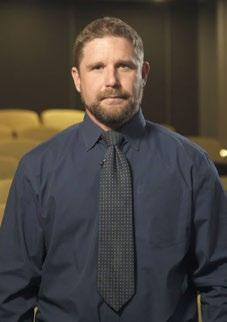
The annual competition enables learners and students to understand the fundamentals of investing by trading JSE-listed shares on a virtual trading platform. Of the 421 schools that competed this year, the majority are from rural areas. Teams from the Eastern Cape dominated by winning the top four awards in the Income category. Mentors from the Walter Sisulu University in Mthatha, who previously participated in the Investment Challenge, have been
instrumental in the teams’ success because of their continuous engagement and giving of their time to the learners.
Ninety-five universities and colleges across South Africa participated in the challenge this year.
Each winner gets a head start to building a secure financial future with a Satrix ETF investment which enables them to grow their winnings through smart investment decisions.
“Our aim is to demystify investment through building a financially literate society from as early as high school. Equipping these learners with the fundamental skills required to build wealth, is part of how we are going about it,” says Ralph Speirs, CSI Officer at the JSE. “We believe that this initiative will be a life-long lesson that can impact what they do with their first income and every earning in their adult life going forward. I am particularly encouraged to see a lot more rural schools not only participating in the investment challenge, but winning top positions whereas in the past, it was predominantly the metro schools that performed well.” Speirs says the JSE is playing a responsible role by teaching learners the value of consistent saving and investing for the long-term, in a country with a low savings rate and little long-term retirement planning.
Each school and university team is given a fictitious amount of R1 million to invest on a virtual trading platform that mimics the live stock market, but without any real risks. Monthly and annual prizes are awarded to the best performing teams, their schools, and their teacher or mentor. The overall winning team members each receives R4, 000 deposited into a Satrix Investment account, with the top performing university team also winning a trip to an international stock exchange plus R25000.
Winners of the 2019 Investment Challenge are:
The Schools Challenge: Income Portfolio ● First place: KCC-Traders, King's Commercial College, Eastern Cape ● Second Place: IZI BAD BOYS, Zimele High School, Eastern Cape ● Third Place: KCC-Commercials, King's Commercial College, Eastern Cape ● Fourth Place: IZI Future leaders, Zimele High School, Eastern Cape ● Fifth Place: Lethas D, Lethukuthula Secondary School, Gauteng
Equity Portfolio: ● First Place: The bizzar investorsPCCP, Acudeo College Crystal Park, Gauteng ● Second Place: Fortius Quo Fidelius, Hoërskool DF Malan, Western Cape ● Third Place: JJJM, DF Malan School, Western Cape ● Fourth Place: Steyn City School - Grade 10A (2019), Steyn City School, Gauteng ● Fifth Place: PHS, Pearson High School, Eastern Cape
Speculator Portfolio: ● First Place: Wise Owls, Queensburgh Girls High School, KwaZulu-Natal ● Second Place: GKBK Pupils, Grenville High School, North West ● Third Place: Minfin Capital, Herzlia High School, Western Cape ● Fourth Place: The PHD's, Ashton International College Benoni, Gauteng ● Fifth Place: Prophets Of Profit, Reddam House Durbanville, Western Cape
Winning teams in the University Speculator portfolio: ● First place: 100 Baggers, University of Cape Town ● Second place: Gym buddies, Nelson Mandela University ● Third place: ARBITRAGE, University of the Western Cape
To find out more, visit: https://schools.jse.co.za and https://university.jse.co.za or contact the Investment Challenge coordinators on 011 520 7344/7129. For further information, visit the JSE Challenge Twitter and Facebook pages.
Redefining the CSI paradigm, one mall at a time
Shopping is an integral part of modern human culture and South African malls from Centurion Mall in the north to Maponya Mall in the south amongst many others have become key components of the local environment and lifestyle. Beyond the convenience, malls are also the epicentre of community life, from creating employment to other downstream economic opportunities.
By Marijke Coetzee, Head of Marketing & Communications, Redefine Properties
Having closely looked at the interplay between local economic and social issues, assets in the communities like the mall for example can provide a good ground to engage with the residents in the communities. Essentially, malls are an asset that can be “used as a vehicle” to meet community needs and to strengthen the community as a whole.
At Redefine, our purpose is to create and manage spaces in a way that changes lives, embodying our understanding that although property is our commodity, people are our business. We also recognise that the socio-economic context in which we operate, fraught with rising unemployment, weak economic
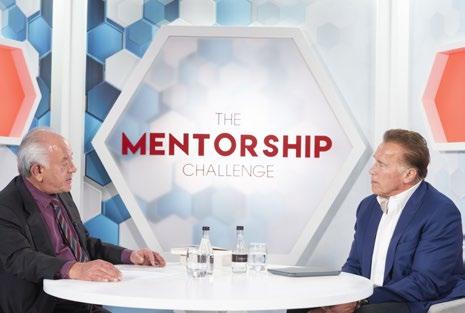
growth and increasing social instability, requires businesses to do more than ever before.
We firmly believe that to shape a more sustainable outlook, a shift from social investment to social innovation and involvement is critical. In line with this thinking, we launched an initiative called the Challenge Revolution, which encompasses several major business initiatives, including the Challenge Convention series, the Innovation Challenge and the Mentorship Challenge. These reflect our belief that we need to remain relevant and forward-thinking by considering and collaborating with the people in and around our properties to identify and address their real needs in a truly South African way. Through
this focus, we are able to tackle material business and social challenges facing the communities such as transformation and skills gaps, while remaining relevant and offering better experiences in our spaces.
Redefine has identified Sustainable Development Goals (SDGs) 8, 9, 11 and 13 against which the interventions will be benchmarked and specifically the National Development Plan for 2030 (NDP), which is closely aligned with the SDGs. The NDP is of high interest and importance to communities as well as the private sector as it shapes and guides programmes for each year until 2030.
Our Asset Based Community Development (ABCD) approach recognises this and the communities as partners who possess the agency and skills to develop and support solutions for sustainable transformation.
We commissioned FNB Philanthropy to develop and host a series of community-centered conversations in Soweto, specifically in the immediate communities surrounding Maponya Mall. These conversations were intended to gather information from the community regarding their assets, social needs and determine the best possible avenues for future social investment in the area.
In its initial phase, the process involved extensive engagements with over 1 000 community members, community-based organisations, local


NGOs, political representatives and local businesses and entrepreneurs. This was followed by the Challenge Convention late last year during which the key representatives from the community were invited to highlight the real challenges they faced and identify existing community assets that could be leveraged to address these. Using #ifihaditmyway to lead discussions; innovative solutions emerged which are now being developed further for implementation.
Some of these conversations revealed that entrepreneurs in Soweto battled to promote their goods and services to potential consumers. Our own ads rang a bell - need space, more space? Many of the entrepreneurs who were interviewed simply wanted space in the mall to exhibit their goods. In other words, the asset based approach immediately identified the problem making it easy for the team to consider ideas to make a tangible difference.
What became apparently clear from these engagements is that to enable the community to sustain themselves, efforts needed to be anchored down to reliably connect the needs of the identified community stakeholders and provide access to resources and information that will promote participation in the local economy.
Amongst the many ideas, a community hub in Soweto has emerged as the strongest. The hub could be an
enabler to scale community development and attract partnerships with other private social investors with similar vision and objectives. The focus is on addressing the needs of the three stakeholder groups in the community, with emphasis on access to services, resources and participating in programmes and opportunities that promote empowerment.
The Maponya Mall pilot is just the first of a number of planned initiatives that Redefine intend to undertake over the next couple of years. Already similar consultation with the communities around Centurion Mall has resulted in a partnership with the City of Tshwane (CoT) to deliver a state of the art taxi rank to the community.
Maponya Mall bears testimony to how ABCD can deliver significant results by simply focussing on equipping and mobilising community members to use their available assets, skills and strengths, to co-create opportunities and build their own communities. At Redefine, we continue to live our ethos and are committed to leveraging the spaces we manage to change the lives and the future of the people and communities around them.
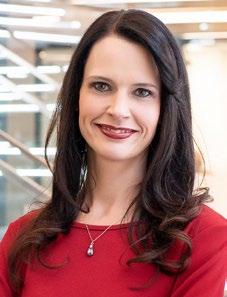
Marijke Coetzee
Five South African REITS (real estate investment trusts) have been named among The Top Empowerment Companies of 2019 in this year’s The Empowerment Report.
In order of most empowered, the REITs are: Arrowhead Properties, Redefine Properties, Growthpoint Properties, Equites Property Fund, and Rebosis Property fund. According to the scorecards for the report, published by Intellidex with research by Empowerdex Research and Advisory, Arrowhead achieved 80.27% (total BEE score 68.23), Redefine 78.52% (91.87), Growthpoint 78.26% (91.26), Equites 70.98% (83.05) and Rebosis 57.08% (66.78).
Estienne de Klerk, Chairman of the SA REIT Association which represents South Africa’s JSE-listed REIT sector, notes the sector’s transformation leaders have achieved an impressive track record of driving best practice aligned with the Property Sector Charter.
De Klerk says: “Having five REITs among the most empowered companies from across all sectors of the South African economy proves that the REIT sector is playing an important role in economic transformation. We are acutely aware that with an active commitment to transformation, responsible and ethical business practices and good governance, SA REITs positively influence our economy and the lives of South Africans through their property assets.”
Commenting on the sector’s transformation journey progress so far, Chairman of the Property Sector Charter Committee of SA REIT, Shawn Theunissen, says: “The SA REIT sector is doing very well in several areas of transformation, and this can be seen especially in the scorecards of those
Estienne de Klerk_SA REIT Chairman


Shawn Theunissen, SA REIT Association Property Sector Charter committee chairman
REITs that are leading the drive to transform. That said, there are opportunities for the sector to do more, and we remain committed to furthering the transformation of South Africa, within SA REITs specifically and the property sector in general.”
SA REIT Association members comprise all publicly listed SA REITs – a sector with the market capitalisation of more than R300bn. As the unified voice of JSE-listed South African REITs, SA REIT plays a significant role for the sector. It provides advocacy in matters of common concern, prepares opinion and policy for interacting with stakeholders, represents the industry in meeting challenges within the sector, and boosts awareness of REITs as a unique asset class that creates and preserves wealth.
Creating a compelling platform for conversations around transformation and other vital issues for the sector, the SA REIT Association is presenting its one-day executive SA REIT Conference, sponsored by Nedbank CIB on 16 July 2020 at Summer Place, Johannesburg.
More information is available at www.sareit.com.











